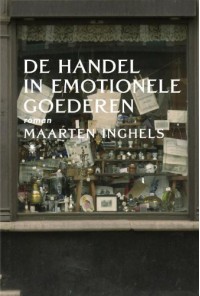De handel in emotionele goederen / druk 1
 Reading Maarten Inghels' debut novel 'De handel in emotionele goederen' was not really what I'd hoped for, since I kept waiting for the story to become gripping (which, in the end, didn't really happen for me). I feel as if I've read a blueprint for a story. 'De handel in emotionele goederen' is relatively short at 206 pages (with quite a few blank ones included) and I can't help but feel the story could do with a bit more body.
Reading Maarten Inghels' debut novel 'De handel in emotionele goederen' was not really what I'd hoped for, since I kept waiting for the story to become gripping (which, in the end, didn't really happen for me). I feel as if I've read a blueprint for a story. 'De handel in emotionele goederen' is relatively short at 206 pages (with quite a few blank ones included) and I can't help but feel the story could do with a bit more body.Luukas Kolibri practices one of those professions most of us hardly think about; he clears the houses of the deceased, sells the valuables and makes sure the house is presentable for future purposes. Occasionally, we also get to read a diary transcript of a sick, older man called René Demeter, who later turns out to be one of the people whose house has been cleared by Luukas. This is a good premise for a story, but I felt as if this book suffered from the same lack of soul I've seen in a lot of other recent Belgian novels. Perhaps this is just me. Perhaps I do not understand this condensed form of storytelling. Maybe, just maybe, I'm not up to speed any more on what kind of book justifies slogans such as '... slaat in als een komeet' (as Max Temmerman states on the cover of Inghels' debut).
It has been some time, though, since I've read a book that dares to be ambitious. I've read a lot of decent stories, but none of them seem to be willing to go overboard. (Even the writing of [a:Herman Brusselmans|187328|Herman Brusselmans|http://d202m5krfqbpi5.cloudfront.net/authors/1286826931p2/187328.jpg] has a tendency to become stale after a while.) And even though the lack of a Belgian Fight Club-esque novel isn't the mistake of mister Inghels (whom I respect a lot, specifically for his 'Eenzame Uitvaart' initiative) I felt almost obliged to mention this at least once.
I guess this makes 'De handel in emotionele goederen' one of many decent novels. It could have been a lot more, I think (maybe if the Robin character was actually likeable?) but for now, I'm glad there's a new name in Belgian fiction, and I'd encourage Maarten Inghels to keep up the efforts.






